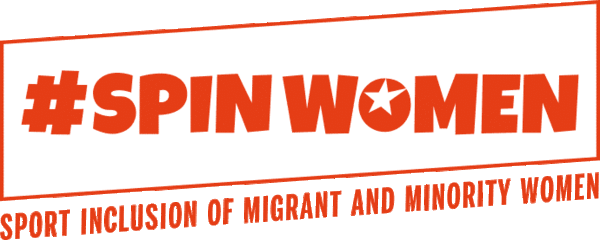SPIN Women
Sport Inclusion of Migrant and Minority Women
Looking at society as a whole, migrant girls and women or women from ethnic minorities are among the most vulnerable and marginalized groups. In European societies in general, but also in sports, where those women and girls are underrepresented and hardly find access to organized sports. And when they do find access, their contribution usually remains invisible.
Against this background, the SPIN network has developed the project "Sport Inclusion of Migrant and Minority Women" (SPIN Women), funded by the Erasmus+ program of the European Commission. SPIN Women aims to advance social inclusion and create equal opportunities through increased participation in sport. After all, sport is a place where people come together and prejudices can be broken down and self-empowerment can take place. So far, however, it has been primarily for men and boys.
SPIN: Partners, activities and tools
The project is coordinated by the fairplay initiative at VIDC. Project partners include the Football Association of the Republic of Ireland (FAI), the Portuguese Players' Federation (SJPF), Camino (Germany), UISP (Italy), Liikkukaa - Sport for all (Finland), and the Mahatma Gandhi Human Rights Organization (MGHRO) from Hungary.
The goal of SPIN Women is to highlight the different perspectives of migrant and refugee women and develop strategies to increase their engagement in sport. This includes building and strengthening leadership skills, as well as qualifying them as coaches and multipliers. In addition, public awareness will be raised and measures for equality will be proposed to the associations.
Multiple discrimination
The SPIN Women project follows a critical empowerment approach involving the different forms of inequality affecting migrant and ethnic minority women (intersectionality). The project is the first Europe-wide sports initiative to systematically focus on the promotion and inclusion of female refugees and asylum seekers, as well as women from ethnic minority backgrounds (such as Roma) in and through sports.
A wide variety of activities will be implemented for two years. These include empirical research on successful strategies and empowerment, training and European networking with women sports stakeholders, events on empowering minority women in soccer and changing European policies, as well as education and awareness raising, including in the European Weeks of Sport and through the exhibition "(In) Visible - Ethnic Minority Women in Sport".
Regular updates on the project can be found on the project page www.sportinclusion.net.



![[Translate to English:] Kick-off-Treffen mit den Projektpartnern. [Translate to English:] Kick-off-Treffen mit den Projektpartnern.](https://www.fairplay.or.at/fileadmin/_processed_/c/e/csm_SPIN_1_acfaeb7703.jpg)
![[Translate to English:] Veranstaltung in Portugal während der Europäischen Woche des Sports. [Translate to English:] Veranstaltung in Portugal während der Europäischen Woche des Sports.](https://www.fairplay.or.at/fileadmin/_processed_/1/c/csm_SPIN_Women_2_77ffb68b9c.jpg)
